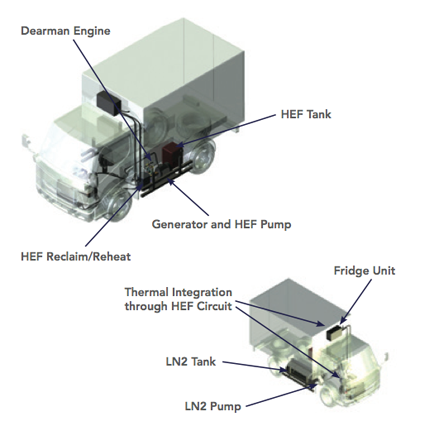Engineering news
A liquid air engine will be fitted and tested in a refrigerated vehicle thanks to a grant from the Technology Strategy Board.
The project will demonstrate the Dearman Engine, an innovative heat exchange engine which uses liquid nitrogen as a fuel. The engine will provide zero-emission cooling and power.
The tests will be done in conjunction with the Motor Industry Research Association (MIRA) and take place before the end of 2014. It will be followed by road field trials.
Loughborough University will serve as academic partner for the project and industrial gases company Air Products will supply cryogenic engineering. An Industrial Advisory Board representing refrigerating vehicle fleet operators will also offer advice.
Once brought to market it is expected that the liquid air engine will cost around £3000.
 The Dearman Engine uses a glycol/ water mix heat exchange fluid (HEF) to deliver rapid heat transfer and expansion within the engine
The Dearman Engine uses a glycol/ water mix heat exchange fluid (HEF) to deliver rapid heat transfer and expansion within the engine
The refrigerated vehicle market is growing and is expected to exceed £6 billion a year by 2015. Cooling accounts for up to 20% of the fuel consumption of refrigerated vehicles.
Independent research has suggested that the Dearman Engine will pay for itself in one year of use through fuel savings. Carbon emissions from the refrigeration cycle are 90% less than that of conventional vehicle refrigeration technologies.
Founding Director of the Dearman Engine Company, Toby Peters, said that the trials will pave the way for work on further applications of the technology.
He explained: “By validating all the key systems of the Dearman Engine in a mobile environment, alongside refueling and other vehicle management procedures, this project will support further applications for the technology such as waste heat recovery from internal combustion engines and zero-emission propulsion.”
A report published earlier this year suggested that hybrid liquid air and diesel engines could reduce diesel consumption on buses and freight vehicles by 25%.
MIRA's commercial manager for future transport technologies and intelligent mobility Chris Reeve said: “Liquid air is an exciting new energy vector and has the potential to make a major contribution to the low carbon challenge facing the transport sector.”